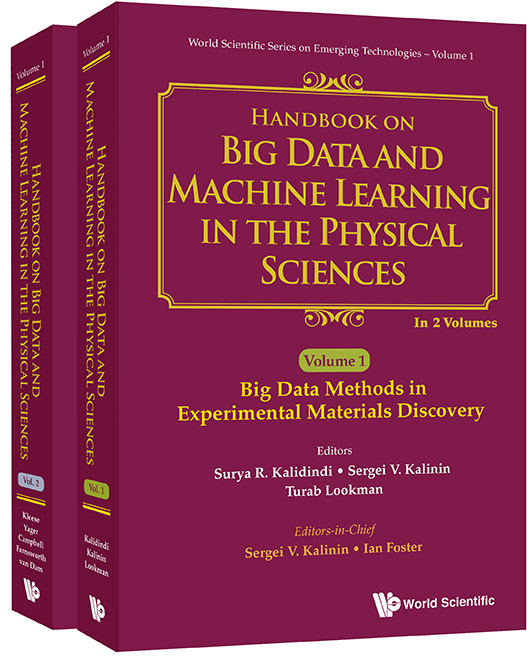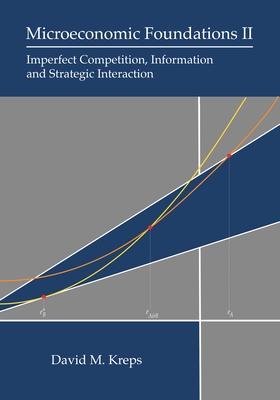图书简介
This compendium provides a comprehensive collection of the emergent applications of big data, machine learning, and artificial intelligence technologies to present day physical sciences ranging from materials theory and imaging to predictive synthesis and automated research. This area of research is among the most rapidly developing in the last several years in areas spanning materials science, chemistry, and condensed matter physics.
Written by world renowned researchers, the compilation of two authoritative volumes provides a distinct summary of the modern advances in instrument — driven data generation and analytics, establishing the links between the big data and predictive theories, and outlining the emerging field of data and physics-driven predictive and autonomous systems.
Volume 1: Big Data Methods in Experimental Materials Discovery (Surya Kalidindi, Sergei V Kalinin and Turab Lookman): Preface (Ian Foster and Sergei V Kalinin); Preface (Surya Kalidindi, Sergei V Kalinin and Turab Lookman); High-Throughput Computational Studies in Catalysis and Materials Research, and their Impact on Rational Design (M A F Afzal and J Hachmann); Machine Learning Approaches for Extracting Process-Structure-Property Relationships from Experimental Data and Literature (Nils Persson, Michael McBride, Elsa Reichmanis, and Martha Grover); Materials Informatics and Data System for Polymer Nanocomposites Analysis and Design (Wei Chen, Linda Schadler, Cate Brinson, Yixing Wang, Yichi Zhang, Aditya Prasad, Xiaolin Li, and Akshay Iyer); Quantitative Multiscale Microscopy of Defects and Deformation for Application to Materials Modeling (Hojun Lim, Jay D Carroll, Douglas L Medlin, and Khalid Hattar); Data Analytics on Phase-Field Simulation Datasets (Yuksel C Yabansu and Surya R Kalidindi); Materials Image Informatics Using Deep Learning (Ankit Agrawal, Kasthurirangan Gopalakrishnan, and Alok Choudhary); Scanning Probe Microscopy in the Information Age (L Collins, S Somnath, SV Kalinin, and A Belianinov); Interpreting Force Fingerprints on the Nanoscale: Machine-Aided Approaches to Atomic Force Microscopy(Matteo Chiesa, Harry Apostoleris, and Chia-yun Lai); Big and Deep Data Methods in Scanning Probe Microscopy and Spectroscopy (Sergei V Kalinin, Evgheni Strelcov, Rama K Vasudevan, and Maxim Ziatdinov); Deep Learning in Electron and Scanning Probe Microscopy (A Maksov, S V Kalinin, R K Vasudevan, and M Ziatdinov); Controlling the Dose Distribution in Scanning Transmission Electron Microscope (STEM) Images by Sub-Sampling and Inpainting (N D Browning, A Stevens, L Kovarik, A Liyu, and B L Mehdi); Micro Computed Tomography in 3D Micro-structural Analysis: Basics, Challenges, Future Perspective (Sourav Mandal and Bikramjit Basu); Deep Learning and the Structural Imaging of Materials (N Laanait); Dictionary-Based Indexing of Large Scale Electron Back-Scatter Diffraction Data Sets (S Singh, F Ram, W Lenthe, and M De Graef); Algorithms in Diffraction Profile Analysis (Susheela P Singh, Alisa R Paterson, Laura J Wendelberger, Chris M Fancher, Brian J Reich, Ralph C Smith, Alyson G Wilson, and Jacob L Jones); Volume 2: Advanced Analysis Solutions for Leading Experimental Techniques (Kerstin Kleese Van Dam, Kevin Yager, Stuart Campbell, Richard Farnsworth, Maartje van Dam): Preface (Ian Foster and Sergei V Kalinin); Preface (Kerstin Kleese van Dam, Kevin Yage, Stuart Campbell, Richard Farnsworth and Maartje van Dam); Experimental Analysis of Powder Diffraction Data (Mark Spillman, Daniel Nicholls and Kenneth Shankland); Analysis Tools for Angle Resolved and X-ray Photoemission Spectroscopy (Andrew Walter); Multi-modal Synchrotron Characterization: Modern Techniques and Data Analysis (Y-c Karen Chen-Wiegart, Stuart Campbell, Kevin G Yager, Yijin Liu, Anatoly Frenkel, Lin Yang, Jianming Bai, Matt McCormick, Daniel Allan, and Mark Basham); Tomographic Reconstruction for Synchrotron Tomography (Dilworth Y Parkinson, Doga Gursoy, Daniël M Pelt, Singanallur Venkatakrishnan, Rick Archibald, K Aditya Mohan, Tekin Bicer, Matthias Vogelgesang, James Sethian, Nicola Wadeson, Mark Basham, and Tomáš Faragó); Next-Generation Information Technology Systems for Fast High-Resolution Detectors in Electron Microscopy (Dieter Weber, Alexander Clausen, and Rafal Dunin-Borkowski); X-Ray Photon Correlation Spectroscopy Data Reduction Using Virtualized Resources (Nicholas Schwarz, Faisal Khan, Collin Schmitz, Ben Pausma, Suresh Narayanan, and Alec Sandy); Machine-Learning Assisted Structure Determination of Metallic Nanoparticles: A Benchmark (Yuewei Lin, Mehmet Topsakala, Janis Timoshenko, Deyu Lu, Shinjae Yoo, and Anatoly I Frenkel); Accelerated Computing for X-ray Ptychography at NSLS-II (Yao-Lung L Fang, Sungsoo Ha, Xiaojing Huang, Hanfei Yan, Zhihua Dong, Yong S Chu, Stuart I Campbell, Wei Xu, and Meifeng Lin); Visual Analytics for Scientific Data in NSLS II (Wei Xu, Sungsoo Ha, Wen Zhong, Shenghui Cheng, Hanfei Yan, Kevin Yager, Xiaojing Huang, Klaus Mueller, and Yong S Chu); Psocake: GUI for Making Data Analysis a Piece of Cake (Chun Hong Yoon); Cross Cutting Software Solutions in Support of Experimental Analysis Challenges at National Scattering Facilities (Thomas Proffen and Garrett E Granroth); Building Mathematics, Algorithms, and Software for Experimental Facilities: The Center for Advanced Mathematics for Energy Research Applications (H Chang, J J Donatelli, P Enfedaque, G Freychet, M Haranczyk, A Hexemer, Z Hu, O Jain, H Krishnan, D Kumar, X Li, L Lin, M MacNeil, S Marchesini, X Mo, M Noack, K Pande, R Pandol, D Parkinson, D M Pelt, T Perciano, D A Shapiro, D Ushizima, C Yang, P H Zwart, and J A Sethian); Autonomous Experimental Design and Execution (Kristofer G Reyes, Francis J Alexander); Optimal Bounds for Nonlinear Partial Differential Equations (Michael McKerns, Francis Alexander, K Hickmann, T J Sullivan, and D Vaughan); Provenance as a Method for Reproducible, Multi-Modal X-Ray Experiments (Huub Van Dam, Eli Stavitski, Simon Billinge, Christopher (CJ) Wright, and Line Pouchard); Cyberinfrastructure and System Software for Online Analysis of Large-Scale Data: Challenges and Design Choices (Rajkumar Kettimuthu, Zhengchun Liu, Tekin Bicer, and Ian Foster); Superfacility: The Convergence of Data, Compute, Networking, Analytics and Software (Katie Antypas, Shane Canon, Eli Dart, Kjiersten Fagnan, Lisa Gerhardt, Doug Jacobsen, Glenn K Lockwood, Inder Monga, Peter Nugent, Lavanya Ramakrishnan, Cory Snavely, Dilworth Parkinson, Alexander Hexemer, and Craig Tull); Policy Considerations when Federating Facilities for Experimental and Observational Data Analysis (Mallikarjun Shankar, Suhas Somnath, Sadaf Alam, Derek Feichtinger, Leonardo Sala, and Jack Wells);
Trade Policy 买家须知
- 关于产品:
- ● 正版保障:本网站隶属于中国国际图书贸易集团公司,确保所有图书都是100%正版。
- ● 环保纸张:进口图书大多使用的都是环保轻型张,颜色偏黄,重量比较轻。
- ● 毛边版:即书翻页的地方,故意做成了参差不齐的样子,一般为精装版,更具收藏价值。
关于退换货:- 由于预订产品的特殊性,采购订单正式发订后,买方不得无故取消全部或部分产品的订购。
- 由于进口图书的特殊性,发生以下情况的,请直接拒收货物,由快递返回:
- ● 外包装破损/发错货/少发货/图书外观破损/图书配件不全(例如:光盘等)
并请在工作日通过电话400-008-1110联系我们。
- 签收后,如发生以下情况,请在签收后的5个工作日内联系客服办理退换货:
- ● 缺页/错页/错印/脱线
关于发货时间:- 一般情况下:
- ●【现货】 下单后48小时内由北京(库房)发出快递。
- ●【预订】【预售】下单后国外发货,到货时间预计5-8周左右,店铺默认中通快递,如需顺丰快递邮费到付。
- ● 需要开具发票的客户,发货时间可能在上述基础上再延后1-2个工作日(紧急发票需求,请联系010-68433105/3213);
- ● 如遇其他特殊原因,对发货时间有影响的,我们会第一时间在网站公告,敬请留意。
关于到货时间:- 由于进口图书入境入库后,都是委托第三方快递发货,所以我们只能保证在规定时间内发出,但无法为您保证确切的到货时间。
- ● 主要城市一般2-4天
- ● 偏远地区一般4-7天
关于接听咨询电话的时间:- 010-68433105/3213正常接听咨询电话的时间为:周一至周五上午8:30~下午5:00,周六、日及法定节假日休息,将无法接听来电,敬请谅解。
- 其它时间您也可以通过邮件联系我们:customer@readgo.cn,工作日会优先处理。
关于快递:- ● 已付款订单:主要由中通、宅急送负责派送,订单进度查询请拨打010-68433105/3213。
本书暂无推荐
本书暂无推荐















